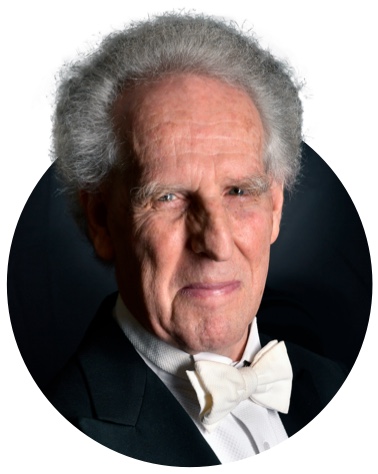Brahms: Cello Sonata no. 2 - 1st movement
Alan Toda–Ambaras (cello) with Dina Vainshtein (piano)

“You dig into a place you’ve never reached in this piece before. It’s another world. It’s a heavenly world. It’s incredible.”
— Benjamin Zander

Video Transcript
Ben Zander: Well, I’m tempted to just sit here. It is such a remarkable performance. It’s so fulfilled and realized in every detail that there isn’t really a great deal to say, which I’m very happy about. Because you are both extraordinary artists and you have amazing intensity in your playing, and I can make just a few suggestions and that’s all. But it’s remarkable what you’re doing. The first gesture is… Do you remember I said to… At the beginning, I don’t know if you were there at the beginning, when I was talking to Zack about what belongs to what and that upbeat… This is… You don’t make that upbeat in Brahms, the bar line is always important, so he has a tremendous tension between the shape of the phrase and the demands of the bar line. Never lose sight of the fact that the F… Is going to the second part of the note, and that happens a lot in this piece. You should do the first chord enormous, like the Metro-Goldwyn-Mayer lion. Like that. But then right down the piano. Make it enormous, just do the opening. You’re right, that’s right. But you can spread it also more… Good. Now, things are built in threes. So often music. So… Then, even that is built in threes… Oh, here… Always in threes. Just make the third one the most, once more. Can you make it real slower on the court? Yes. So you have this… Separate. That was great. That was much better.
Alan Toda–Ambaras: I have a question.
Ben Zander: Yeah.
Alan Toda–Ambaras: I’ve heard different opinions on how to treat these-
Ben Zander: How do you do what?
Alan Toda–Ambaras: The ties. Whether to think of them occasionally as…
Ben Zander: You mean this?
Alan Toda–Ambaras: Yeah.
Ben Zander: Always think of it going over the bar line, not collapsing from it… Just like you did. It’s fantastic tension, it’s wonderful. Do it again. Make the spread of the court. Can I suggest you do the… Off the gesture with every node, so it doesn’t sound so… That’s a little broader than you were doing it and I think it’s grand. It’s very, very effective. Could you just try from this… Do from here. It’s so funny, Brahms has a crescendo diminuendo on one note on the piano. What was he thinking? Oh, all you can do is kind of go, oh, but the thing is to play it a little more. He literally has a crescendo diminuendo on a single note. It’s very funny. Do once again. Do from here, very dulce… And B… F major. That’s so wonderful, that repeat. Don’t make a diminuendo there because there’s nothing there. This is so grand here. Wow. Do good. Do… Over the bar line. Not… Do from there. You know, I’ll tell you a secret. My teacher, Casado, when he played that, he didn’t… he did… Just on two notes, staccato. I mean like this, just to play the two notes and it’s…No, just… Play it, there. Right. Because the beauty of that, it doesn’t disturb this at all. You don’t want to… It’s so intrusive because it’s so beautiful. Do that from there again, from that F major. Right. That’s beautiful. Isn’t that great? Do you know why that moment is so incredibly touching? He hasn’t touched B flat major once in the B’s and it’s the subdominant of the B’s and you’d expect he would… He hasn’t touched it. So strategic and clever and wonderful. When that moment finally comes, the transformation of that heroic theme, into this most tender, loving moment, should we just try from the cello? That’s the same as… Right. Yeah. I wouldn’t make that… Because what you’re doing is adding a beat there and it’s so beautiful because this theme… Never ends. It never completes itself. It always stops in the middle. Except here. This is the one time, the only time in the piece… Finally comes down to a real F major arrival. Do it the way you did it, but when it comes… Make it a surprise only dynamic, do not timing. But that was very beautiful. Would you try one more time from there?
Ben Zander: Bravo, bravo. That was more beautiful than anything you did in the first performance. That was so beautiful. It was partly inspired by the piano because she did it so beautifully, but then you dig into a place you’ve never reached in this piece before. It’s another world. It’s a heavenly world. It’s incredible. Do it one more time. Well done, bravo. You know, it’s interesting about… The difference is only being braver, being more expressive, being just everything you’re doing, but a little bit more than that. Sometimes the first performance was rushed, or at least driven, so that you didn’t have enough time to say everything that the music had to say. Now you had all the time in the world to say it. It’s beautiful, really. It’s great, great playing. I wouldn’t want to hear it any more beautiful playing than you did it.